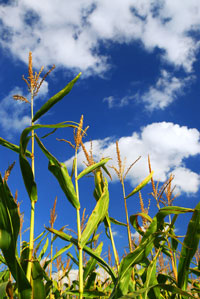AgBioResearch scientist studies impacts of climate on corn-based cropping systems
MSU awarded a $20 million grant by help keep Midwest corn-based cropping systems resilient in the face of future climate uncertainties.
 The U.S. Department of Agriculture National Institute of Food and Agriculture (USDA-NIFA) has awarded a $20 million grant to nine land-grant universities, including Michigan State University, and two USDA Agricultural Research Service institutions in the north central region to help keep Midwest corn-based cropping systems resilient in the face of future climate uncertainties.
The U.S. Department of Agriculture National Institute of Food and Agriculture (USDA-NIFA) has awarded a $20 million grant to nine land-grant universities, including Michigan State University, and two USDA Agricultural Research Service institutions in the north central region to help keep Midwest corn-based cropping systems resilient in the face of future climate uncertainties.
Over the next five years, a team of 42 researchers will collect and analyze data from the region – an area that produces 8 billion bushels of corn, representing 64 percent of the annual harvest in the United States.
MSU AgBioResearch scientist Sasha Kravchenko will lead the experimental work on greenhouse gas emission and carbon sequestration at two sites in Michigan and will contribute to the task of developing up-scaling tools for generating state- and regional-scale predictions and recommendations based on the project’s findings.
Kravchenko, an associate professor of crop and soil sciences and the MSU co-principal investigator (along with Bruno Basso, an adjunct associate professor at the W.K. Kellogg Biological Station), said the project’s multi-scale data collection approach will provide researchers, producers and the agriculture industry with unique capabilities to enhance the productivity and resilience of corn-based cropping systems.
“We are very excited about this project,” she said. “It will provide a unique opportunity to have consistent information on changes in soil carbon and greenhouse gas emissions across the entire Midwest, something that is desperately needed for researchers to be able to scale up the results from small-scale experiments to the whole region.”
Basso will lead crop modeling efforts exploring performance of corn-based systems under future weather scenarios.
Researchers will begin collecting data on carbon, nitrogen and water movement this spring from 21 research sites in eight states. Special equipment will be used to monitor greenhouse gas emissions at many of the sites. The team will integrate field and climate data to create models and evaluate crop management practices.
The USDA-NIFA program is focused on decreasing greenhouse gas emissions and increasing carbon sequestration. The long-term national outcome is to reduce the use of energy, nitrogen and water by 10 percent and increase carbon sequestration by 15 percent through resilient agriculture and forest production systems.



 Print
Print Email
Email




